Opinions
Understanding is needed around method behind Rassie’s six year contract
Gavin Rich, writing for Business Day
An understanding of the method behind the six-year contract awarded to new Springbok coach Rassie Erasmus might diminish the one point of concern that has counter-balanced an otherwise positive response to the appointment.
Where the negativity comes from is Erasmus’ status as the first Bok coach to be contracted for six years. That does seem like a long time, particularly when South African rugby has just had to endure the frustration of having to part ways with a Bok coach who had to be bought out of his contract. But what the detractors of Erasmus’ appointment to the 2023 World Cup are missing is that he is also the first Bok coach to double as a director of rugby.
The concerns are understandable. Erasmus is a good coach, but even Jake White, who was the first coach appointed for a four-year cycle back in 2004, did not go through his tenure without finding himself in the exit lounge at some point. Neither did the two coaches who followed him before the appointment of Coetzee.
Apart from questions relating to what happens if Erasmus has to be paid out of a six year contract, there were others asked on social media that were the right ones to be asking. For instance, what did the contracting of the same coach until 2023 say about SA Rugby’s commitment to transformation? And where does it leave those who have been lobbying for South African rugby to introduce some overseas vision into the coaching team?
Deon Davids hasn’t been in the top level coaching game to be backed as a national coach right at the moment, but he did do wonders as coach of the Southern Kings in the 2017 Super Rugby season. The exodus of players due to the Eastern Cape franchise’s uncertain future has cost the Kings, but given the resources to work with, Davids might in the next two seasons confirm the promise he showed in Super Rugby and show that he is ready to make the step up.
Then there is the possibility of New Zealander John Mitchell making a compelling statement as coach of the Bulls. The column I wrote a couple of weeks ago suggesting Mitchell could be the Bok coach after the 2019 World Cup was not a thumb suck. It was the impression Erasmus gave me after his return from Ireland. As national director of rugby, he was open minded about the possibility of Davids or Mitchell featuring in the Bok plans beyond 2019 if they prove themselves in the interim.
Mention though of Erasmus’ position as director of rugby introduces the subject of where Erasmus differs from his predecessors. Put simply, Erasmus just has a greater sphere of responsibility than any of the other 13 post-isolation Bok coaches had, and while he should be lauded for publicly committing the Boks to immediate success and a quick rise back up the world rankings, much of his vision requires long term planning for it to be successful.
Erasmus has had experience of being a director of rugby in the South African rugby environment before. Although they gave him the title Senior Professional Coach, director of rugby was effectively his role at Western Province.
When Erasmus arrived in Cape Town in 2008 he set about introducing a symmetry in vision and a unified pathway through the age-groups and other levels of rugby in the Western Cape that would ultimately benefit the senior provincial team. He prioritised succession planning and endeavoured to turn previous weaknesses at the union, such as defence and forward play, into strengths. He was never just the coach of the senior team.
The reason Erasmus never saw his goal properly realised at WP was because an administration that is too driven by the politics of amateur office bearers elected out of club rugby didn’t understand Erasmus’ vision and the realities of the professional game and kept interfering.
The way I understand it, Erasmus’ appointment as Bok coach until 2023 is more about giving him control of the process and giving him the authority that he didn’t have at WP to implement much needed succession planning than it is about him wanting to be the de facto coach for that entire period.
The Davids or Mitchell scenarios, or for that a Johan Ackermann or Swys de Bruin scenario, can still happen if Erasmus feels it would work for the Boks. The six years is more to secure his directorship for that period, meaning his authority to make the decisions, than his position as Bok coach.
Also read Rich on SuperSport
KEO News Wire
England slice and dice blunt Razor and his frail Fall Blacks
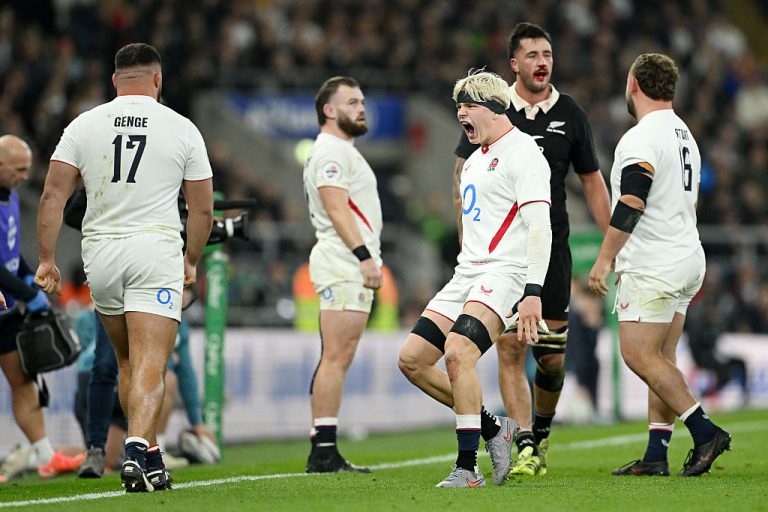
Razor Robertson’s players may have worn black at the Allianz Stadium in Twickenham, but they were an insult to the great All Blacks teams that have visited Rugby’s headquarters, writes <strong>Mark Keohane. </strong>England crushed them.
The coach feted as the Knight in Shining Armour never arrived on a stallion. Instead he has come on a donkey, such has been his lack of impact with the All Blacks.
The Springboks, in Johannesburg and Cape Town, showed up the conservative lack of intent with Robertson’s selections and game plan in winning back to back Tests in 2024.
In 2025, the Boks humiliated the All Blacks 43-10 in Wellington, New Zealand, scoring 36 unanswered points.
Argentina also felled Robertson’s All Blacks , in Wellington in 2024 and winning easily in Buenos Aires in 2025.
At Twickenham’s Allianz Stadium, every critique of Robertson’s conservatism in selection and indifference in style of play and consistency in performance, was again on display.
The All Blacks scored two early tries to lead 12-0 before 20 minutes, but lost the last hour 33-7. It could – and should – have been more.
This was a dominant England and the only time I can recall England being so in control was in the 19-7 World Cup semi-final in 2019. Back then the only question was how did the All Blacks get seven points and how did England only get 19?
On Saturday, how did England only get 33?
Robertson was gifted the All Blacks job on the basis of seven successive Super Rugby titles with the Crusaders, but Test rugby is not Super Rugby, and Robertson has been the biggest disappointment in his lack of vision and lack of delivery in the biggest Tests.
Since his opening Test in 2024, a one point win against England in Dunedin, his teams have underwhelmed and scraped wins.
The highlight was the 24-17 win at Eden Park against the Springboks in 2025, when the All Blacks led 14-0 after 15 minutes and then hung on for the last 65 minutes. A week later they lost in record-breaking fashion.
Robertson’s All Blacks have gone nowhere in two seasons and walloping Wales next Saturday won’t mask the stagnation of the All Blacks under Robertson.
England’s win was just their ninth in history against the All Blacks in 47 starts, but given the state of the All Blacks they should demand playing them a few times every year while Robertson is in charge. They will quickly move that figure into double figures.
England, 10 wins in succession, are easy on the eye and look very good.
They will be tested more in the Six Nations than they were by Australia, Fiji and the All Blacks, but unlike Robertson’s All Blacks, their graph is on the up.
KEO’S ACCUMULATOR: I GAVE ALL BLACKS HISTORY TOO MUCH CREDIT
⌚️ Henry Pollock chipping through the loose ball to set up Tom Roebuck for the try to seal England’s victory over the All Blacks at the Allianz 💪🤩
#Breitling
#DefiningMoment
@Breitling
pic.twitter.com/UiQnbzbGwmQuilter Nations Series (@QuilterNations)
November 15, 2025
KEO News Wire
Fans’s View: Springboks coaches Rassie & Jacques rock!

Give Springboks coaches Rassie Erasmus and Jacques Nienaber credit. They have made Springboks rugby lekker rugby, writes Shaheen Daniels.
Erasmus, as head coach and Nienaber as his defensive coach, won the 2019 World Cup. The Springboks were sensational hammering England 32-12 in the final in Japan.
The duo changed roles after the 2019 World Cup. Erasmus invested his core energy into the game as National Director of Rugby and Nienaber was made head coach.
The duo masterminded a brutal 2-1 series win against the British & Irish Lions in 2021 and they have won at Twickenham against England and beat the All Blacks on the Australian Gold Coast and were brilliant in beating the New Zealanders 26-10 in Nelspruit in 2022.
There were narrow defeats to Ireland in Dublin and to France in Marseilles, but Daniels’s view is that as a rugby supporter the duo have built one of the strongest and most enjoyable Springbok squads, and that it was right that they were given six years to do so.
‘I just feel that a lot of people are not giving Rassie Erasmus and Jacques Nienaber enough credit for their efforts and commitments. In the past coaches only had four years to prove themselves and the sad thing was that a coach was always told that this is “the previous coaches’ players”. Therefore, I have never enjoyed the rugby as much as I do now, because a group of players are involved and understand their roles. The coaches have faith and trust in the players and want to win a World Cup title back-to-back, because in the past it was difficult due to a one-off four year tenure.
‘Their faith in Manie Libbok speaks for itself, because of the defensive structures and DNA in the current Springbok setup. Rassie did mention in the past it does not help to play expansive rugby and score many tries, whereas you are also leaking tries. Therefore, Manie is needed for the expansive style of play.
‘Not to bad mouth Handré, because he is rock solid and likes to attack the line, however I really thought that they might take a consultant like Swys De Bruin and a kicking coach like Percy Montgomery. However I am just a fan and Rassie and co knows far better. And they have my unconditional support.
‘Springbok rugby is lekker rugby!’
Photo: Mike Hewitt/Getty Images
KEO News Wire
Fans’ view: Is 2019 Springboks player loyalty a gift or a curse?

Springboks supporter Klein Strydom fears that too many of the 2019 South African Rugby World Cup winners are past their sell-by date.
Strydom, in his Fans’s view, does not know whether to applaud the loyalty Rassie Erasmus and Jacques Nienaber have shown to the 2019 World Cup winning players or to fear it.
Loyalty: Surely a trait that most people would admire? Will it win the World Cup for South Africa this year? Is there room for loyalty in professional rugby?
KEO News Wire
Fans’ view: Frank’s fed up with Farrell favouritism

Keo.co.za will bring you a daily Fans’ view as we head into the World Cup. The first up offering is aimed at England flyhalf Owen Farrell and Frank Montgomery writes it is time to red card Farrell for good.
Now I know that the issuing of a red card, especially early on in a contest, is a very contentious issue – the feeling is that it robs spectators from a fair contest, when you have 15 playing against 14. The other side of the coin is that player safety is considered paramount these days, so one has to act and address foul play.
So will it be considered fair if Mr Owen “No Hands” Farrel takes out one of your key players during the World Cup final, but the team is allowed to replace him after a certain period of time? He clearly has no intention to address and correct his style of tackling, but keeps on escaping punishment, yet can have an impact on final outcomes of vital games.
In my opinion the issue of a yellow card, to be reviewed during the 10 minutes the player is end off, is a great new addition – I just feel that if the decision is overturned to a red, the player in question should be called back on to the feel and presented with a red card in his face and the team should not be allowed to replace him at all!
*Farrell was yellow carded for an illegal tackle against Wales at Twickenham, and this was upgraded to a red card by the TMO. The England captain will face a disciplinary on Tuesday and by all accounts should get a six demerit point suspension.
Farrell earlier in the season was suspended for four matches because of head high, no arms, tackle. It was reduced to three matches because Farrell attended a one-day ‘Tackle School Clinic’.
World Rugby confirmed that a player can only attend one such clinic in his professional career as part of mitigation, so Farrell can’t rely on that luxury on Tuesday.
An all Australian Disciplinary Committee will oversee Farrell’s Disciplinary in what could be described a Kangaroo Court, which if effective could ban Farrell for the last England warm-up against Ireland and at least two of the first Group matches in the World Cup.
WATCH: OWEN FARRELL’S RED CARD TACKLE
Photo: Ashley Western/MB Media/Getty Images
KEO News Wire
Snubbing Etzebeth and Savea cheapens World Rugby’s Player of the Year award

World Rugby for the second year in a row have released a nomination list for World Rugby Player of the Year that screams oversight and apathy, and Springboks lock Eben Etzebeth and dynamic All Black Ardi Savea are again victims of this shocking selection process, writes Mark Keohane. (more…)
KEO News Wire
Why Williams is the way forward at scrumhalf
On a disappointing night in Cork, after a dire display from South Africa’s “A” side, there was one shining light in Sharks scrumhalf Grant Williams, writes Mark Keohane.
SA “A” conceded four tries in the first half to lose 28-14 to Munster. It’s 80 minutes every South African supporter will really feel they can never get back, but if there was one positive to take from a game otherwise not worth even dissecting, it was that Grant Williams has shown again that he needs to be backed in Springbok colours.
When the Boks finally backed Jaden Hendrikse to start, there was a notable difference in their attacking energy, with the half-a-second extra time on the ball that Hendrikse’s service allowed. Hendrikse was a huge improvement on the notoriously slow passing of Faf de Klerk, but the scrumhalf with the quickest service in South African rugby at the moment is Grant Williams.
Pick him.
Faf de Klerk was perfectly suited to the 2019 Springbok team, whose pack dominated every set piece and allowed him to drop bomb after bomb on the opposition back three. That has not quite been the case over the last year, and the Bok set piece – especially the lineout and the maul – has been a shadow of its previous presence. As has De Klerk, whose sluggish style of play has proven costly and predictable.
Watch: Boks to boss Les Bleus in Marseille
Entrusting Damian Willemse at 10 is making a statement of intent and accepting that the Springboks will be playing a different style of rugby. Imagine how Willemse would thrive off the sort of delivery that Williams could give him from the base of the ruck.
What has become very apparent is that after storming onto the scene prior to the 2019 World Cup and making a few good cameo appearances here and there, Herschel Jantjies just is not up to scratch anymore. He hasn’t been for the Stormers and he most certainly was not for the Springboks last year or SA “A” last night. Jantjies’ kicking game has proven more an asset to the opposition than an attacking weapon for his own team, and his decision-making remains erratic.
The Boks have picked Faf de Klerk to start against France this weekend, and what we can expect – once again – is a fairly one-dimensional approach, that is no longer suited to this current Springbok team. There seems to be a bizarre lack of foresight in the decision-making of the Springbok management, and where steps were taken in the right direction by backing Willemse and Hendrikse as a combination, there is an immediate regression to conservative old ways as soon as pressure put on them by a loss.
Grant Williams needs to be in that Springbok side. He possesses such a dynamic, fast style of play at scrumhalf, and is equally comfortable on the wing – a necessary consideration for a Bok team that needs a back-up kicker on the bench more so than an extra outside back (given Willemse can play fullback too).
The Springboks’ lack of domination at set-piece is a real concern, but what is more concerning is the inability to situationally adapt. The Bok coaches continue to pick a team that plays a direct, confrontational and conservative style of rugby, but then are found scrambling when that approach does not work and these players are expected to try and play expansively and score tries come the second half.
Willemse is not a flyhalf who sits deep in the pocket and slowly moves a team forward by potting long-range territorial punts, so he needs a scrumhalf intent on playing to his fluid, elusive style. Hendrikse has begun to offer him that, but Grant Williams is the way forward if the Springboks are serious about embracing a stylistic change to their backline’s attack.
Watch: Zels and my predictions for Saturday’s clash
Picks – @mark_keohane and Zels predict that it will go down to the wire when the Boks clash with France in Marseille on Saturday. pic.twitter.com/Awe17qrjcF
— SA Rugby magazine (@SARugbymag) November 10, 2022
Opinions
Bok coaches have backed the right horses for All Black opener
For their opening Test against the All Blacks, the Springboks need the experienced halfback pairing of Faf De Klerk and Handre Pollard to fire, and the Bok coaches have got it spot on by bringing De Klerk back into the starting lineup, despite his indifferent form over the Welsh series, writes Mark Keohane.
Certain players within your system you trust, and for the Springboks Faf De Klerk is one of those. De Klerk’s kicking game and disruptive style of play is an important element in allowing the Springbok gameplan to thrive, and it is all the more important against a side like the All Blacks, who struggle when against sides and players who are able to disrupt their continuity.
Read: Marx strikes 50, Faf back for Boks
Jaden Hendrikse had a fantastic few games against Wales, and his passing game along with the speed at which he plays will be a welcomed factor from the bench. But in a game as big as the All Blacks, it would be silly to simply ignore the years of experience between De Klerk and Pollard, based on an indifferent start to the season.
Yes, De Klerk was neither here nor there and yes, Pollard was far from his best against Wales, but does that mean they should be discarded so quickly when we have seen what they are capable of in the biggest moment? According to the rugby public, yes. For me, it’s a hard no, and I’m relieved to see that the Springbok coaches have backed the horses who have come through for them time and time again for this opening Test.
One hopes that the Welsh series offered a chance for the likes of Pollard and De Klerk to shake off the cobwebs and come fresh into what will be a non-stop international season from Saturday’s Test to the end of year tour where the Boks will face France, Ireland and England.
I believe the two will come good against New Zealand, and they will do so emphatically. What Faf’s lack of form allowed for against Wales was for Hendrikse to be given an opportunity, and his success has just strengthened South Africa’s stocks at scrumhalf. Building to the World Cup it does not have to, and must not be, a case of De Klerk or Hendrikse, it very much should be a case of both. We have seen the success of similar stories in our front row!
When it comes to Saturday, Handre Pollard needs to be kicking at 80%. No team cannot afford penalty and conversion misses against the All Blacks.
Nienaber and Erasmus have picked the right generals for Saturday, but the onus is on De Klerk and Pollard to capitalise on forward dominance and marshall the match in a manner that truly represents their class as players.
Watch – @mark_keohane and @Zels77 say that the @Springboks should've unleashed Evan Roos against the @AllBlacks this weekend. pic.twitter.com/ygsDMPd4iQ
— SA Rugby magazine (@SARugbymag) August 2, 2022
In terms of the decision to stick with Jasper Wiese at number 8, it is one that will ring unpopular with much of the South African public, but one that despite my own fondness for Evan Roos and Elrigh Louw, I can understand tactically. Roos and Louw will feature against Australia, and it is very likely a case of the Springbok coaches believing this is the environment in which their skillsets will be best put to use in their debut seasons of Test rugby. Both Louw and Roos should have long Bok careers ahead of them, and their absence from the squad for the first Test against the All Blacks should be no cause for concern. There is still a whole Rugby Championship and end of year tour to be played.
Damian Willemse finally asserted himself at Test level in the Boks home series victory against Wales, and I’m happy to see him backed again at fullback, where he thrived over the three Tests. Willemse’s role is becoming more and more integral to the Boks’ selections and tactical approach, as he offers a great option at inside centre later on in the match, and acts as flyhalf cover.
Willemse’s shift into the starting XV has also very naturally allowed for Willie Le Roux’s transition to the bench, where we are seeing a much more comfortable and natural role for Le Roux. The fullback’s experience has proven handy in the final thirty minutes, and where last year it felt like the Boks were losing something by starting him and pulling him off at half time, they’ve gained so much by having him as a second-half safety option from the bench. Le Roux, if need be, can also come in at flyhalf.
The Boks are well covered by their bench for Saturday, and the versatility of the starting players. As always, their pack is interchangeable and regardless of who starts they boast the best in the world from 1-5. Malcolm Marx starts what will be his 50th Test and we can expect a huge shift from the man who marked his arrival on the Test scene with a performance against the All Blacks in 2017 that the New Zealand Herald gave a 10/10.
The Boks are positioned perfectly to welcome the All Blacks to South Africa by beating them. The coaches have been clever in their selections, and avoided public sensationalism to field close to their best possible side. Not just in terms of who starts where, but how the combinations unfold throughout the game between starters and substitutes.
The Springbok pack needs to dominate the All Black forwards in much the same way that a Leinster-dominated Irish pack did over the course of their 2-1 series victory in New Zealand. Based on the selections made for Saturday, they should. Off the back of that, De Klerk and Pollard can do some serious damage with a backline that, bar two players, remains the same as the one that won the World Cup in 2019 and inspired a series win against the British & Irish Lions.
Opinions
Mark Keohane picks his July internationals World XV
Only three Springboks make my World XV from the July internationals, writes Mark Keohane. What is your best XV this past month?
A disclaimer, I have not considered any French players from their two-Test series win against Japan and none from the Argentina v Scotland three-Test series impressed me enough to crack the World XV.
I focused primarily on the Big Three Test series’s in South Africa, Australia and New Zealand.
I’ve also considered the comparative strengths of the sides, in terms of opposition, which has influenced my decision-making.
Ireland were outstanding in the first 20 minutes of the opening Test defeat in Auckland and transferred those 20 minutes into 160 minutes in the final two Tests, which they won.
But as good as the Irish played, this is the worst coached and selected All Blacks match-day squads I have reported on since the game turned professional in 1996. They are imposters the Mighty McCaw World Champion Class of 2011-2015.
I felt Wales had the toughest assignment of the northern hemisphere teams and Ireland had the easiest, given who they actually played and not being seduced by the history of who they were playing. When I say easiest, not to be misinterpreted as easy.
Historically, there is no tougher assignment that the All Blacks in New Zealand but in the context of the current fragility of the men in black and the sub-standard pedigree of their head coach Ian Foster, this was a series out of kilter with the quality of what the All Blacks have traditionally produced at home.
Australia and England were very evenly matched and it showed with one score basically separating the two teams in all three Tests.
Wales surprised me and were better than I thought they would be and the Boks overall disappointed me and were not as convincing as I thought they would be, although they showed enough in the third and final Test to give me comfort they will improve at home against New Zealand in August.
Ireland, with seven, provide the most from one country.
So, here’s my July World XV and there will be a few honourable mentions as well.
15. Damian Willemse (SA)
14. Will Jordan (NZL)
13. Robbie Henshaw (Ire)
12. Owen Farrell (Eng)
11. James Louw (Ire)
10. Jonny Sexton (Ire)
9. James Gibson-Park (Ire)
8. Ardi Savea (NZL)
7. Tommy Reffell (Wales)
6. Peter O’Mahony (Ire)
5. Lood de Jager (SA)
4. Tadhg Berne (Ire)
3. Tadhg Furlong (Ire)
2. Malcolm Marx (SA)
1. Ellis Genge (Eng)
*Henshaw can play 12 and 13 and De Jager is comfortable at 4 or 5.
England’s Freddie Steward gets an honourable mention at fullback. Other honourable mentions, every player in the Irish match-day 23 for those final two Tests, especially flanker Josh van der Vlier, Eben Etzebeth (SA, lock) and Siya Kolisi (SA, flank) for their third Test performances, Steven Kitshoff (SA, prop), Frans Malherbe (SA, prop), Damian de Allende (SA, centre), Louis Rees-Zemmit (Wales, wing), Dan Biggar (Wales, flyhalf), Courtney Lawes (Eng, flank), Jack van Poortvliet (Eng, scrum half), Jack Nowell (Eng, wing), Samu Kerevi (Aus, centre), Michael Hooper (Aus, flank), Tom Wright (Aus, wing), Beauden Barrett (NZL, flyhalf) and Duhan van der Merwe (Scotland, wing).
New Zealand Herald Sport’s World XV
15. Freddie Steward (ENG)
14. Tom Wright (AUS)
13. Samu Kerevi (AUS)
12. Robbie Henshaw (IRE)
11. Marika Koroibete (AUS)
10. Johnny Sexton © (IRE)
9. Nic White (AUS)
8. Ardie Savea (NZL)
7. Josh van der Flier (IRE)
6. Peter O’Mahony (IRE)
5. Eben Etzebeth (RSA)
4. Tadhg Beirne (IRE)
3. Tadhg Furlong (IRE)
2. Dan Sheehan (IRE)
1. Ellis Genge (ENG)
Simon Thomas – Wales on Line World XV
15. Freddie Steward (Eng)
14. Damian Penaud (Fra)
13. Lukhanyo Am (RSA)
12. Robbie Henshaw (IRE)
11. Emiliano Boffelli (ARG)
10. Johnny Sexton (IRE)
9. Jamison Gibson-Park (Ire)
8. Ardi Savea (NZL)
7. Josh van der Flier (IRE)
6. Courtney Lawes (ENG)
5. Eben Etzebeth (RSA)
4. Tadhg Beirne (IRE)
3. Tadhg Furlong (IRE)
2. Malcolm Marx (SA)
1. Ellis Genge (ENG)
Opinions
Bullish Marcell Coetzee must be a Springboks discussion
Marcell Coetzee will not be picked for the Springboks. The current coaches just don’t rate him. Siya Kolisi will be picked. The current coaches will never leave him out, writes Mark Keohane.
Coetzee was colossal in the Vodacom Bulls quarter-final win against the Cell C Sharks in the Vodacom United Rugby Championship.
Kolisi was noticeably absent in his influence.
Both players know the national situation. Coetzee knows he won’t be picked and Kolisi knows he will never be dropped. It doesn’t mean there can’t be a discussion about Kolisi’s limited impact in his first season at the Sharks and Coetzee’s monumental contribution to the Bulls since he returned to South Africa from Belfast, Ireland.
Kolisi was my South African player of the season in 2021. He was colossal for the Springboks and he is a player who saves his best performances for the national team, so this is not a point made about whether it should be Kolisi or Coetzee in the Springbok squad.
This is a statement about pre-determined merits, where no matter what the one player does not do, there is no consequence and no matter what the other player does, there is no reward.
I understand Coetzee has accepted that while the incumbent Springboks coaching duo of Rassie Erasmus and Jacques Nienaber are in charge, he will not play for the national team. It is also accepted that Kolisi’s position, as a starter and captain, would never be a discussion.
The Bok coaches will always justify an omission with a question of ‘who do I leave out?’ But in this case, it should not warrant a question but an acknowledgement. You don’t have to leave out anyone but you you can add someone.
The Bok coaches will be judged by their results and since taking charge in 2018 Rassie Erasmus and Jacques Nienaber have won a World Cup, a Rugby Championship and a British and Irish Lions series. For some, they are beyond a question given they’ve won the big three.
But for others, like myself and possibly every Bulls fan, the question can still be asked, why the disdain for Coetzee?
It surely can’t be performance!
Coetzee is the stand out forward in South Africa, in presence and consistency.
It is one of those unfortunate situations when a player knows that all he can control is his display and the reward will be exclusive to his regional team’s position.
Coetzee has never publicly bemoaned his absence from the national squad and he has never taken to social media or traditional media to trash talk the national coaches. Each week he just goes out and delivers for himself, his teammates and his coach at the Bulls.
It is this type of attitude that got the Bulls into the URC’s semi-finals and it is this type of attitude that means Coetzee, at club level globally, always commands interest and gets so many offers. It isn’t quite the same at the Sharks where 10 of their players can get invited to the national squad, but they can’t advance beyond a quarter-final or finish in a top four.
As it is, the one Sharks player who should be training with the Springboks, No 8 Phepsi Buthelezi, didn’t get an invite.
The 17 players invited to train with the Springboks were predictable in the announcement, but again I felt something was missed in not having Lions flyhallf Jordan Hendrikse a part of the squad.
I don’t know what Hendrikse gains from a flirtation with the Blitzboks when clearly his future is as a No 10 in XVs.
Evan Roos was not in the first Springboks camp alignment. Just how he wasn’t is disconcerting but ultimately he got recognition for his performances.
The Bulls and DHL Stormers advanced to the semi-finals of the URC as the two best South African teams.
Very few Bulls players will be added to the Springboks squad for the three-Test series against Wales, but the Stormers will have greater representation.
It is an odd one when you consider the Bulls beat SA ‘A’ or a midweek Springboks XV in Cape Town last year and at Loftus on Saturday beat a Sharks team with 10 current Springboks squad members.
It should be a discussion but unfortunately it is just an accepted situation – a situation that should never be accepted.
So, people let’s discuss …
Mark Keohane in the Sunday Times on South Africa’s European invitation
Opinions
Fired up Fourie would be fantastic for Springboks
I would pick Deon Fourie for the Springboks this season and view him as an insurance policy for the 2023 World Cup in France, writes Mark Keohane.
The DHL Stormers veteran will be 37 years-old when the Springboks arrive in France next September to defend the World Cup won in Japan in 2019.
The DHL Stormers play Edinburgh in the Vodacom United Rugby Championship at the DHL Stadium in Cape Town this weekend and another big performance from Fourie is a given.
Each week on social media I applaud the qualities of the Stormers and Western Province senior statesman, and each week I cop abuse from the very same ignorant mob who mocked me when I suggested Schalk Brits could add value to the Springboks in the build-up to the 2019 World Cup. That same mob was out in full force when I made a case for Morne Steyn to be part of the Springboks Test match squad for the three-Test series against the British & Irish Lions.
‘What?’ screamed the mob. ‘Move on man …’
Typically, the response was to get in a 19 year-old as part of the youthful cheerleading.
Kids don’t win teams World Cups and they don’t win teams big series’ like the British & Irish Lions.
There is nothing in sport that can compare with a veteran, with global experience, still playing with the enthusiasm of a teenager and producing player of the match performances with great regularity.
Fourie, in 2022, has been that player for Western Province and significantly for the Stormers in the United Rugby Championship.
Brits, primarily a hooker but blessed with such a range of skill that he could comfortably have played in the midfield, was massive for the Springboks at the 2019 World Cup, even though he did not play in the final.
Brits was part of the leadership group, captained the Springboks at No 8 as a 38 year-old and added a dimension to the well-being of those players not in the play-off match day squads. His influence was immense and the Springboks were beneficiaries of a professional career that totalled 380 matches.
Equally influential was Steyn in the Springboks winning the Test series against the Lions.
Steyn, having retired from Test rugby at the end of 2021, is still playing for the Bulls in the URC and Currie Cup and will end the season having taken his professional first class match total past 420.
Fourie, who has played 96 times for Western Province, 91 for Lyon, 84 for the Stormers and 42 for Grenoble, will end the domestic season on 350-plus matches. He shows no sign of letting up and still leads from the front.
Fourie’s URC form would have everyone raving if he was 20 years-old. The fact that he is 35 years-old should be of no consideration. His numbers are tangible and his off-field influence are intangibles with possibly even more currency.
But for the purposes of the ill-informed and ignorant, it is worth repeating just this one URC statistic: Fourie, in the League was among the leading turnover specialists.
The Springbok coaching duo of Rassie Erasmus and Jacques Nienaber have never been afraid to invest in veterans, and hopefully in the next few months they will also acknowledge the form of Fourie.
SA Rugby Magazine: For Fourie Age is Just a Number
Watch: SA Rugby Magazine editor Zelim Nel and Mark Keohane preview the Vodacom URC Play-offs
Opinions
Dobson’s delightful Stormers dominate SA’s URC Team of Season
The DHL Stormers are South Africa’s best Vodacom United Rugby Championship team and that is why their players dominate my SA team of the season, writes Mark Keohane. John Dobson is also my SA coach of the league.
DHL Stormers coach John Dobson has had to overcome the departure of some of the most prominent and experienced World Cup-winning Springboks in Damian de Allende, Eben Etzebeth, Pieter-Steph du Toit, Bongi Mbonambi and Springboks captain Siya Kolisi. He, at the beginning of the Vodacom United Rugby Championship was also dealing with a failing executive that was subsequently put under administration.
Dobson, once freed up to coach thanks to the quality of the administration job done by former SA Rugby Union CE Rian Oberholzer and a new interim Board, trusted his instincts to persist with his pursuit of a flamboyant and expressive playing style that he felt spoke to the cross cultural make-up of rugby in the Western Cape.
The DHL Stormers, with just one win from their opening five matches, revelled post Oberholzer’s arrival, which allowed Dobson to get back not the field and apply his mind exclusively to the task of coaching and leading the Stormers. The results were incredible, with the DHL Stormers doing the double over Jake White’s Vodacom Bulls in two bruising encounters and coming from 22-7 down in Durban to draw 22-all against the Cell C Sharks and then beating the Durban’s Galacticos 20-10 at the DHL Stadium in Cape Town.
Pick your SA URC Team of the Season: Back three
The DHL Stormers won eight in succession, seven in a row at the DHL Stadium, and only lost one of their final 13 league matches to be crowned SA’s first ever Shield Winners. #ALLFOR1
Hats off to Dobson. His team have a delight to watch and they deservedly will host a home play-off on 4th June.
DHL Stormers make ups 10 of my XV, Cell C Sharks get two players, Vodacom Bulls two players and the Emirates Lions get one on a wing and a prayer.
Mark Keohane’s SA Vodacom United Rugby Championship Team of the Season
15. Aphelele Fassi (Cell C Sharks)
14. Madosh Tambwe (Vodacom Bulls)
13. Lukhanyo Am (Cell C Sharks) – v/capt
12. Damian Willemse (DHL Stormers)
11. Edwill van der Merwe (Emirates Lions)
10. Manie Libbok (DHL Stormers)
9. Grant Williams (Cell C Sharks)
8. Evan Roos (DHL Stormers)
7. Elrigh Louw (Vodacom Bulls)
6. Marcell Coetzee (Vodacom Bulls)
5. Marvin Orie (DHL Stormers)
4. Adre Smith (DHL Stormers)
3. Frans Malherbe (DHL Stormers)
2. Scarra Ntubeni (DHL Stormers)
1. Steven Kitshoff (DHL Stormers) – capt
Coach: John Dobson (DHL Stormers)
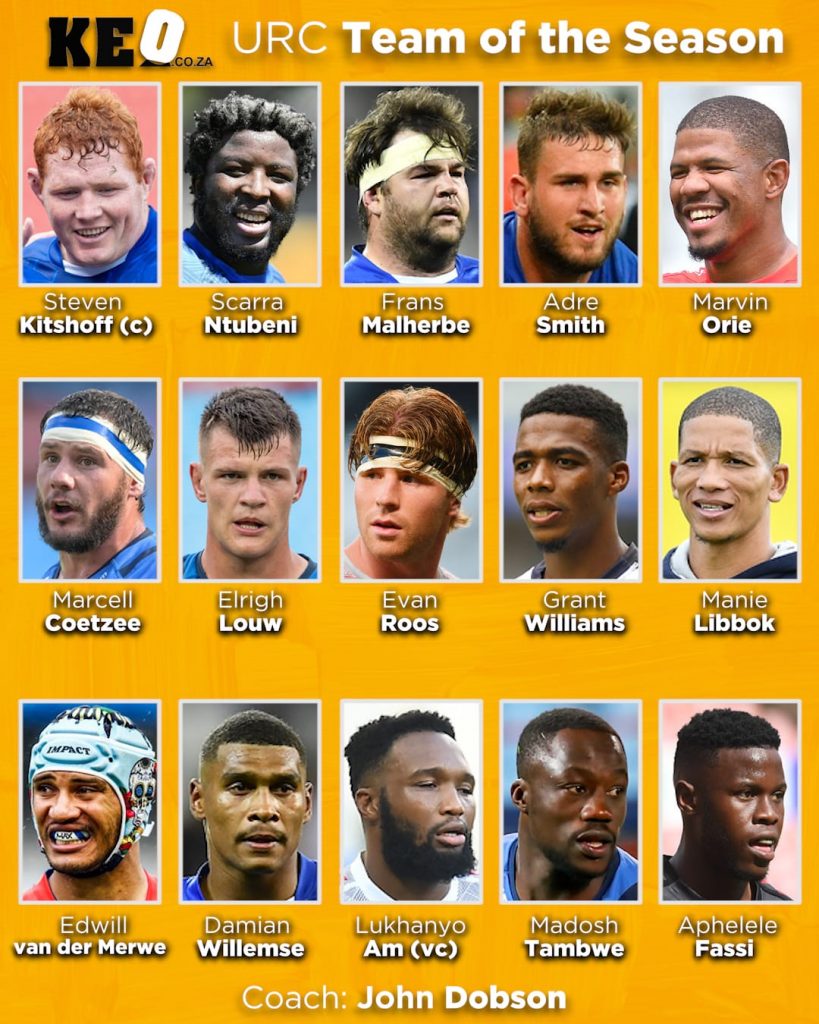
SA RUGBY MAGAZINE’S Vodacom United Rugby Championship SA Team of the Season
Photo: Ben Evans/Huw Evans/Shutterstock/BackpagePix
Keo TV
Scott Gibbs: South Africa the greatest place in the world to play rugby

SA Rugby Editor Zelim Nel and I spoke with legendary Welsh and British & Irish Lions centre Scott Gibbs about the United Rugby Championship, the state of the South African franchises and how the tournament has begun to take shape and where it will go in the future, writes Mark Keohane.
Reflecting on the South African teams’ recent hot run in the URC, Gibbs spoke of being amazed by the wonderful generation of South African player coming through the ranks. We were all in agreement that the four South African franchises would again dominate with results this coming weekend, as has been the trend since the northern sides began coming down south a month ago.
Only now has the tournament begun to really take shape and Gibbs, impressed by the quality of rugby being played, believes that come next year the URC, with the return of crowds a much more settled calendar, will emerge as one of the best domestic tournaments in world rugby.
Gibbs, who in many respects led the charge of the 1997 British & Irish Lions team that beat the Springboks, said he believes that touring South Africa will become one of the biggest experiences for the teams from the Celtic nations, as it is the greatest country in the world to play rugby and one of the most enjoyable to experience as a tourist.
For our full conversations, as well as our predictions for the four South African URC fixtures this weekend, watch below:
Opinions
Robust Roos makes a statement for Springboks
Stormers No 8 Evan Roos put down a marker for the Springboks, but as much fun as it is to watch South African teams hammering those from up north in the United Rugby Championship, there isn’t one South African team good enough to beat Leinster in Dublin and win the competition, writes Mark Keohane. (more…)
Opinions
Lukhanyo Am; World’s best 13 and SA’s best player
Find me a 13 in world rugby better than Lukhanyo Am , and find me a player better than him in South Africa at the moment. Am is currently South Africa’s most impactful player, and his performance both at Test and domestic level puts him in rare class of consistency among world rugby’s elite, writes Oliver Keohane.
There are very few players who are capable of bouncing between the pressure of Test level to the physical rigour of a domestic season and maintaining the standard of performance expected of them. But aside from the physical demands of what has effectively become a year-round rugby season, there is something to be said of the ability of a player to switch on mentally for a domestic season, after coming off a few months of Test rugby. Conversely, to handle the step up from domestic to Test level is an equal mental effort that many do not handle with such ease.
Lukhanyo Am is not many, he is in the special class of player that is seemingly incapable of a poor performance either at Test or domestic level.
Am’s trajectory has been such that where he was lauded initially for his understated organisation of defence and low error-rate, public perception has widened to appreciate his incredible attacking flair, leadership skillset and domineering presence on n the field. While Am is consistently one of the best at Test level, it has become glaringly obvious in both the Currie Cup and URC that he is often the most impactful player on the pitch.
Lukhanyo Am was a late Test find, so to speak, but since his first selection it has become obvious that the Springboks have found the solution to the outside centre issue that Jacques Fourie’s absence left for many years. Am has started in 25 of his 26 tests, of which he has won 17. He’s contributed 25 tries, including one against the British & Irish Lions, which was nominated for World Rugby Try of the Year. More importantly perhaps, have been those that he has assisted… Look no further than Mapimpi’s World Cup final try against England, and Damian De Allende’s in the Springboks win over the All Blacks last year, which started with an incredible offload from Am.
Am has won a British & Irish lions series, won a World Cup and won a Rugby Championship. He has done that in under 30 Tests. Those statistics are phenomenal, and they given added weight by the fact that Am was an integral figure in every one of those accomplishments.
What has been incredibly refreshing and inspiring, in light of his superb three years with the Springboks, is his immediate impact as Sharks captain since the domestic season kicked off. In December Am helped the Sharks to a win over the Bulls, with a stunning intercept try, and in his most recent game ran in the most ridiculous of tries against the Bulls again, straight from the kickoff, to help the Sharks secure another win over them.
Sharks coach Sean Everitt, after their most recent win, lauded Am as the best centre in the world, and I doubt there are many arguing with him. I certainly am not, and his consistency for both the Sharks and the Springboks is a rarity and a commodity.
There are days where we wonder how Lukhanyo Am makes rugby look so 𝙚𝙖𝙨𝙮 😳
Unbelievable skills from the Sharks captain against the Bulls in the Vodacom #URC.
Here's that incredible piece of play with 𝙓𝙝𝙤𝙨𝙖 𝙘𝙤𝙢𝙢𝙨 🎙️ pic.twitter.com/bvbtfnklmA
— SuperSport 🏆 (@SuperSportTV) February 13, 2022
Opinions
Stormers in for a shock, Ireland set to rock
I sat down with The MoneyMan and SA Rugby Mag editor Zelim Nel to make our picks for this weekend’s URC and Six Nations. I’m expecting the Lions to shock the Stormers in Johannesburg, and Ireland to show why they are the number 2 team in the world at the moment, against a much-hyped French side.
WATCH: URC Preview
WATCH: Six Nations Preview
ALSO ON KEO:
Rassie; pick Ruan Ackermann before it’s too late
Opinions
Rassie; pick Ruan Ackermann before it’s too late
Rassie Erasmus, please give Ruan Ackermann a call and let him know that he will be a Springbok. Before England pick him up to play international rugby, says Mark Keohane.
South Africa needs to secure the services of Ruan Ackermann before he becomes another foreign import who instead of aiding the Springbok cause, becomes a South African competitor. In our latest show for SA Rugby Magazine, myself, Zelim and Ollie discuss Ackermann’s situation and look at the rest of the South African talent taking over the northern hemisphere.
Saffas Abroad: Ackermann, Du Preez steal the show in England
Ruan Ackermann in his time at Gloucester has grown as a player, and grown in an environment without his father as head coach. His growth and success has also come in one of rugby’s toughest domestic competitions globally in the English Premiership. Since leaving the Lions and embracing England as home base, Ackermann has consistently been a standout loose forward among the many internationals who play across the Premiership.
And while South African locals forget with such ease the likes of Ackermann (a talented player who went overseas early), he has not for a moment forgotten his dream of playing for the Springboks. Ackermann, in chatting to SA Rugby Magazine, said that while it would be an honour to play for England, he has never stopped wanting to be a Springbok. The fact that he has come into his best rugby in England does not mean that he should be written off for international inclusion in South Africa, and it would be terribly amiss in a season in which Ackermann is in the form of his life, to risk losing him to England. Especially when he is explicit in his desire to still represent his home country.
Ackermann is among a host of South African players performing in the top ten percent in the northern hemisphere, especially as a loose forward – just think the Du Preez brothers, Jasper Wiese and Marco Van Staden. But all these players have already been blooded as Springboks, and South Africa can rest easy knowing that they will offer their services to the Boks for what should still be long and illustrious careers. That comfort isn’t there yet with Ackermann, who has qualified for England via World Rugby’s residency law, and at any minute could get a call from Eddie Jones and be lured by the lights of Twickenham because South Africa never bothered to call.
Rassie, Jacques, don’t let that happen. Get on that phone to Ackermann as soon as possible to let the kid know that he is in the mix.
WATCH:











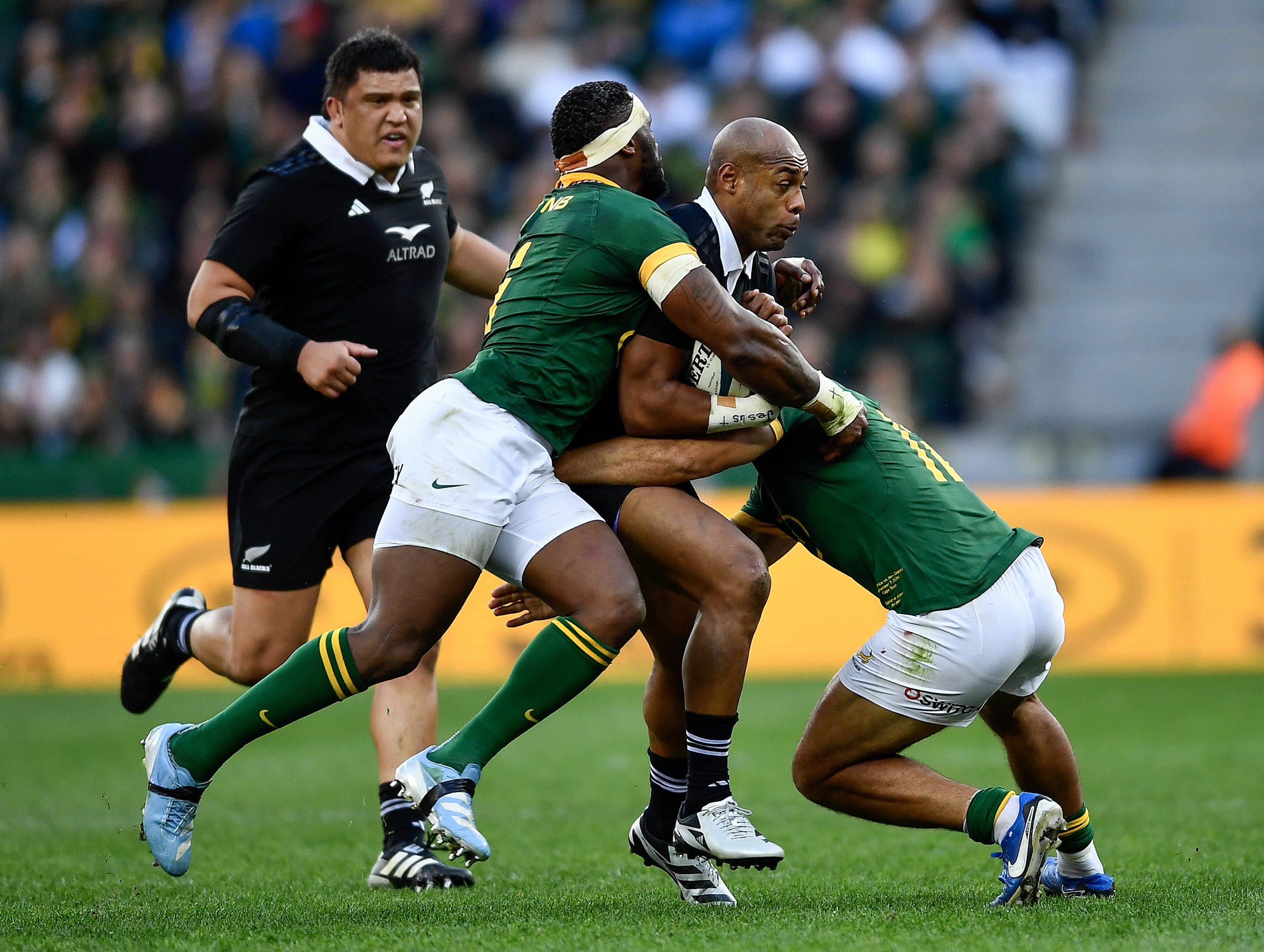


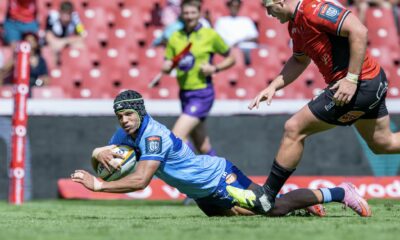

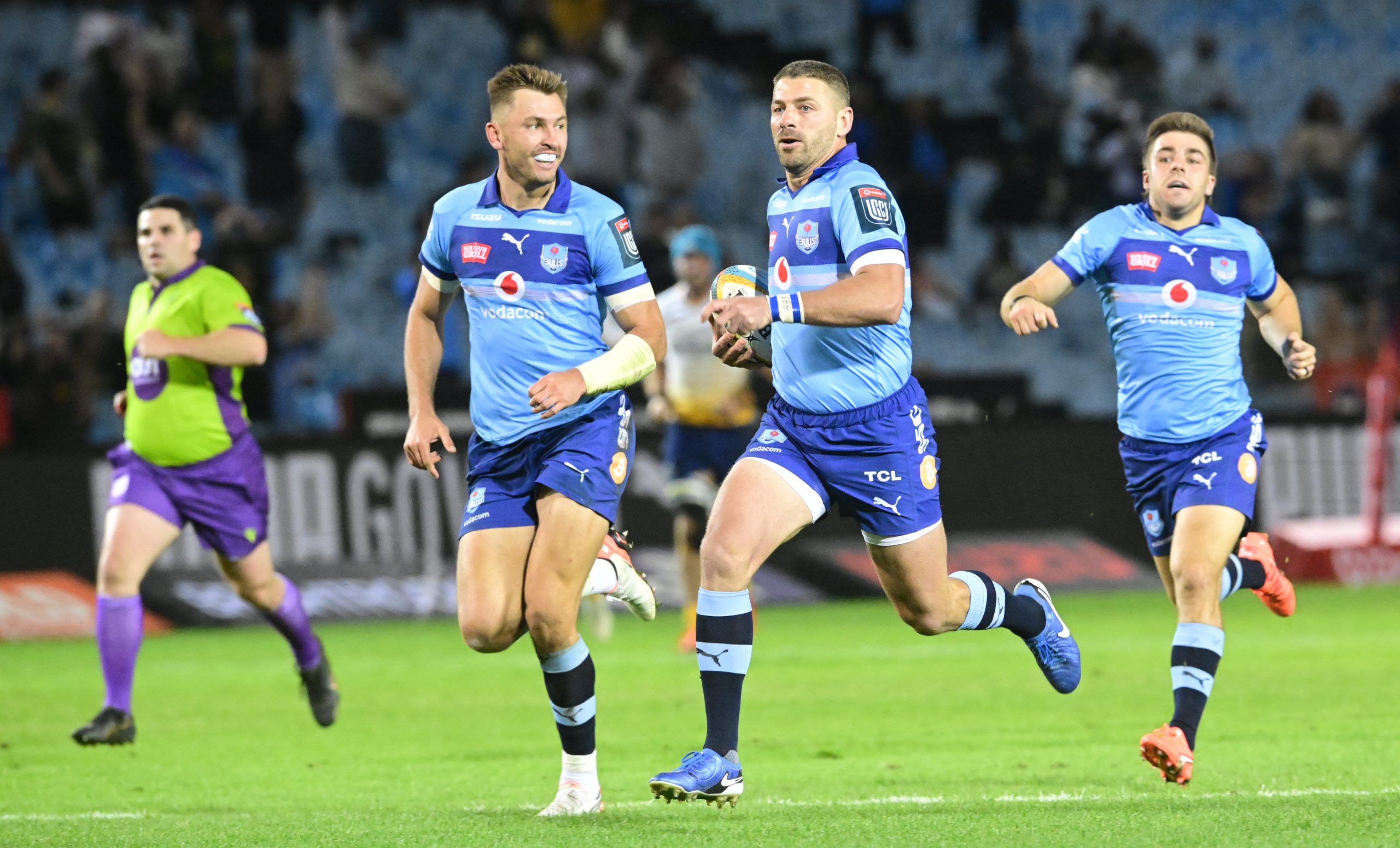
Pingback: When young starts becoming old - The proliferation of teens being blooded in Super Rugby - KEO.co.za